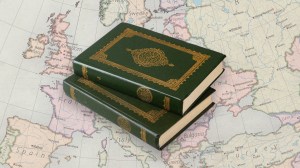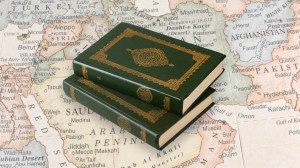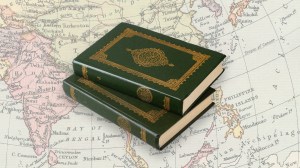In this series

Touching the Soul of Islam, by Bill Musk
When talking about Muslim-Christian engagement, I always start with this sensitive and eye-opening book. Islam is seen as “a way of life” that touches all aspects of a Muslim’s life. Bill Musk, a retired Anglican bishop for North Africa, focuses on helping Westerners understand a Muslim’s worldview, including dynamics like honor and shame and the family and the individual. His aim is to help us understand how our Muslim neighbors think and react, so that we can present the gospel to them in a way that they can hear. Together with the follow-up companion book The Unseen Face of Islam, this work is an excellent entry into exploring these important areas with Musk as a trustworthy guide.
Holy Books Have a History, by Keith Small
When talking with our Muslim friends about faith, very quickly the topic of trustworthiness of the scriptures will come up. Typically the Quran is presented as perfectly preserved and the Bible will be perceived as changed and corrupted. Keith Small’s work on texts and manuscripts is a helpful input into this discussion. The Bible has been subject to intense scrutiny of textual criticism for more than 100 years, but this process has only just begun for the Quran. Indeed, Dr Small’s own work is one of the ground-breaking approaches in this area.
Holy Books Have a History is both accessible and enjoyable, with helpful reproductions of key early Quranic manuscripts, clearly showing that it too has a textual history. This is not to say it’s full of errors but rather to illustrate that both the New Testament and the Quran have textual problems and strengths. The key point here is that the Quran and New Testament are similar in textual reliability and that we can’t reject this in one and accept it in the other.
Thinking Biblically About Islam, by Ida Glaser and Hannah Kay
Many of us have a number of Muslims as friends, work colleagues, neighbors, and family. To help us engage well in the midst of this major change, Ida Glaser and Hannah Kay provide a framework for thinking and for taking to the Bible questions raised by our interactions with Muslims.
The authors encourage us to read the Bible looking at the world in which the text was written, the composition of the text, and then the significance of this for today, modeling this approach on Genesis and the Transfiguration. They maintain that the takeaways from examining these two sections in this way can then be used to illuminate discussions of faith with Muslim friends.
It is a wonderfully sensitive book. Although it is particularly helpful for church leaders and those engaging with Muslims, it’s also a very good model for how to think biblically on any subject in our modern, changing world.
Last Resort: Migration and the Middle East, by Jonathan Andrews
Immigration is one of those hot topics that people vehemently disagree about and that has been part of the downfall of more than one politician. It’s also a key part of how Europe is being shaped.
Religious freedom advocate Jonathan Andrews’s book looks at immigration’s impact on religious communities, as well as the forces upon the mass movement of people from the Middle East, especially its historic Christian communities. This book offers a thought-provoking argument about why we should want these communities to stay in their homelands while also helping us better understand the Middle Eastern context and our refugee and migrant neighbors.
Seeking Allah, Finding Jesus, by Nabeel Qureshi
One of the best guides for Christians looking to see how to present Jesus to their Muslim friends, Nabeel Qureshi’s book is not only a personal journey of his encounter with and faith in Jesus but also an incredibly insightful exploration of key questions that Muslims face as they get to know Jesus better. Qureshi relates his struggles with issues like Jesus being the Son of God, comprehending the Trinity, and what happened at the Crucifixion (and therefore the nature of salvation) in a way that engages the reader both intellectually and emotionally. His chapter on understanding the Trinity alone is worth reading by any Christian wanting to know how to grasp the concept and stand firm on it.
One note of caution is that Qureshi was Ahmadiyya, an offshoot of Islam that other Muslims often despise, and if brought directly into a conversation with a Muslim colleague, that fact may shut the conversation down. That being said, this is the one book I would recommend to any who want to engage in matters of faith with their Muslim friends.
Read our authors’ bio in the series’ lead article, The Best Books for Understanding Islam and Connecting with Your Muslim Neighbors. (Other articles in this special series are listed to the right on desktop or below on mobile.)
















